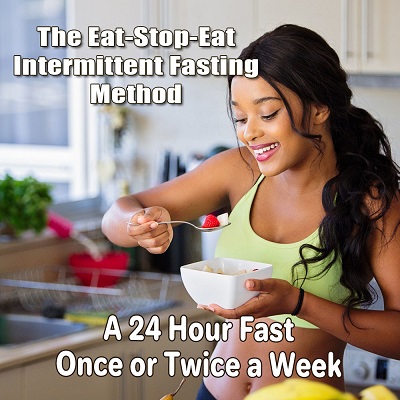 Intermittent fasting is one of today’s hottest topics in the fitness and health space, thanks in part to some celebrities popularizing this way of losing weight. This diet method involves when you are going to eat or not, rather than what food you should avoid. Research has also backed intermittent fasting as an effective way to lose weight.
Intermittent fasting is one of today’s hottest topics in the fitness and health space, thanks in part to some celebrities popularizing this way of losing weight. This diet method involves when you are going to eat or not, rather than what food you should avoid. Research has also backed intermittent fasting as an effective way to lose weight.
One way to do intermittent fasting is called the “Eat-Stop-Eat” method. In this diet, you fast for 24 hours straight once or twice a week, and then resume your normal eating after the 24th hour. For instance, if you start fasting at 7 p.m. on Friday, you can start eating again at 7 p.m. on Saturday.
Fasting for 24 hours once or twice a week helps you lose fat. This is because the “Eat-Stop-Eat” method creates a calorie deficit so your body uses more of your stored energy (a.k.a. body fat) to give you fuel for your energy needs.
Fasting has also been linked to several health benefits like reduced insulin and blood sugar levels, improved metabolism, and the prevention of degenerative diseases. It also helps the body to repair itself during the period that you don’t eat anything.
Eat-Stop-Eat is perfect for newbies to intermittent fasting, and many find it easier to follow compared to other diet programs. You don’t even have to think about the foods you should prepare or the foods you should give up. You just stop eating and then start eating again once the 24 hours have passed. It sounds simple enough, although it may not be that easy for some people.
If you want to try the Eat-Stop-Eat method, here are a couple of things you need to know:
How To Do Eat-Stop-Eat Properly
Going into a strict diet to lose weight can be stressful, especially if you have to go on calorie-counting or avoid your favorite foods. That’s one of the reasons the Eat-Stop-Eat has been an attractive option because it eliminates the stress of thinking about the calorie counts and the foods you should and should not eat.
You only have to deal with hunger pangs once or twice a week, and then you can eat whatever you want when the time is up.
But “whatever you want” does not mean bingeing. Overeating would cancel out the calorie deficit you had on your fasting day, and poor food choices will not help your overall health. Remember, the effectiveness of intermittent fasting depends on whether or not you do it properly.
You can pick any day of the week to fast based on what fits your schedule and personality well. You can choose a day when you are extremely busy with work or a weekend when you can do something you love. That way, time will fly and you will be less likely to notice your hunger.
On your fasting days, you can take water to keep you hydrated, as well as unsweetened tea and coffee. During your non-fasting days, remember to eat moderately. While Eat-Stop-Eat does not set restrictions on the foods you consume, there are still recommendations on what you should eat, and what you should not.
Go for generous servings of vegetables, as well as fruits and spices. Also, eat foods that are rich in protein. If you exercise, do weight training three to four times a week on non-fasting days to maintain or build your muscle. Also, avoid cardio or other very rigorous work on fasting days.
Is It Effective?
Several studies have shown that Eat-Stop-Eat is an effective tool for losing weight. Provided that you do it properly, you can lose about 1 pound per week. To make intermittent fasting beneficial to you, you should also avoid the common mistakes that might cancel out your calorie deficit and stall your weight loss.
This includes having a feast meal during your non-fasting days. The key to that is to manage your hunger well. Load up on protein-rich food on your last meal before you fast because it can make you feel full for much longer.
Because you have the total freedom to pick a day to fast and reschedule it based on what’s convenient for you, you may end up not fasting at all. So, you have to keep the rescheduling at a minimum and stick to your commitments.
What the Drawbacks Are
While Eat-Stop-Eat has proven to be effective and has other health benefits, intermittent fasting has its drawbacks as well. For one, this diet is for generally healthy adults only. If you have pre-existing conditions or are taking medications, you need to consult your physician first.
Intermittent fasting can also affect your social interactions, such as when you need to have meals with family and friends. So choosing the schedule that suits your lifestyle best is important. Since Eat-Stop-Eat does not have a set meal schedule, some people may find it challenging to stick to. It requires self-control and responsible, mindful eating.
The Eat-Stop-Eat method of intermittent fasting is a simple yet effective way of losing weight, especially for first-timers. Eat responsibly and do it right, and you will see how it can help you reach your ideal weight.






